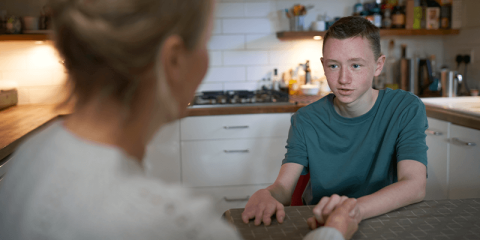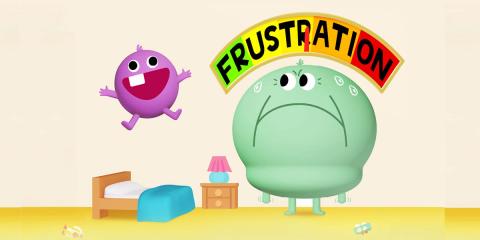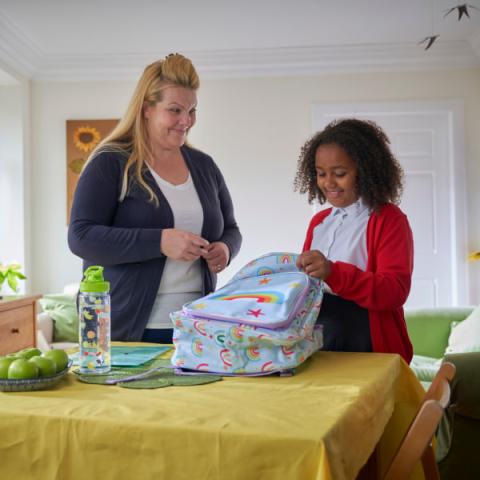We all have mental health – and it’s just as important to take care of it as it is to look after our physical health. If our mental health is good it means we can think, feel and react in the ways we need to in order to cope with day to day life. But sometimes we think, feel and react in ways that make it hard to cope.
Tips to look after your mental health
Everyone feels stressed, anxious, emotional or overwhelmed at times, but it’s important to make sure that ‘at times’ doesn’t become ‘all the time’. Here are some tips for looking after your mental health and getting support – because there’s lots of help out there, so don’t be afraid or embarrassed to access it.
Tip #1: Keep active and get outdoors

Keeping active and getting outdoors is good for everybody, you and your children. Even though the weather might not always be on our side, there’s no such thing as too much fresh air. Being outside clears the mind, reduces stress and helps to cheer everyone up. You can find lots of ideas for getting out and about and active with the family here.
Tip #2: Go for a mindful walk
Did you know that the sound of bird song can actually help calm anxiety? So just for once, head out for a short walk and leave your phone at home (or switch it off) and listen to the sights and sounds around you instead.
For more tips for boosting your mental health and to hear what other people have found helpful, check out NHS Inform’s Mind to Mind website.
Tip #3: Keep to a routine
Keeping to a routine can help everyone feel more secure because you know what’s going to happen when, and can help you feel more in control. You could start small by getting up at the same time every day, or trying to stick to regular meal times, or going for a walk every day, and build your routine from there. Or you could try breaking the day down into small tasks, to make it seem more manageable. Planning your activities can help take the pressure off as well. Why not get the kids to help you plan the week ahead? Our page on making daily life easier has more tips.
Tip #4: Stay in touch
If you’re feeling a bit low, there’s nothing like a good blether with a friend to lift the spirits. Try to find a quiet moment for a phone call or video chat – if you can’t get any peace at home, how about sitting in the park to make a call? That way you’ll get the double benefit of fresh air too!
Tip #5: Try some relaxation exercises
If you’re feeling tense, spending a few minutes a day doing some relaxation exercises may help. NHS Inform has lots of ideas you can try, including relaxation videos and a playlist. Relaxing and being mindful can help you focus on the present, rather than dwelling on the past or worrying about the future.
Tip #6: Do something you love
Remember that time before you had kids, when you could do things like read, play music, go to the gym, spend time with your partner or even just watch a TV programme that isn’t aimed at 4 year olds?
Try and carve out a bit of time each week to rekindle those lost interests and do something you love. Not only will concentrating on something different help you de-stress, but pursuing an interest can also help raise your self-esteem.
Tip #7: Add 'me time' to your to do list

If you have a to do list you need to get through, it’s tempting to think ‘I’ll take time out when I get to the bottom of the list.’ But when did anyone ever get to the end of a to do list? There’s always something new to add on. So instead, why not add ‘me time’ to the list every so often? And make sure that item gets ticked off!
Tip #8: Turn off the news
It is good to keep up to date with what’s going on, but too much news could negatively affect your mental wellbeing. Stick to trusted sources and maybe set a time during the day to check. Constant social media updates can feel overwhelming too, so maybe switch off in the evening and do things that relax you instead.
Tip #9: Cut yourself some slack
Being a parent is a tough job and sometimes it can feel as if everyone else is finding it so much easier than you are. But here’s the thing: they’re not. So instead of worrying about the things you haven’t done, try giving yourself a huge pat on the back for all the things you have achieved. At the end of the day it can help to make a list of three things about the day that have been good – maybe the kids told you they loved you, or tidied their rooms without having to be asked more than twice – to remind you of what a great job you’re doing.
This article from Tiny Happy People helps bust the myths that parents need to be perfect – there’s no such thing as a perfect parent!
Tip #10: Think about things you're grateful for
This can be tricky when you’re stressed. But if you can, take a little break, and try to find the positives around you. It could be that the wee one who kept you up all night is smiling right now. Or maybe your partner is making your favourite dinner tonight.
If that doesn’t do the trick, make a plan to do something for yourself that day. Parenting has a lot of challenges, it’s important to enjoy the sweet moments too.
Tip #11: Laugh out loud
This might sound a little weird, but laugh your head off whenever you can. Laughter releases a happy hormone called oxytocin. It tells your brain and muscles to relax and opens up your emotions. It’s like you can feel the stress physically leaving your body. And on top of all that, if your kids are around they’ll probably laugh with you (or at you).
Tip #12: Get a good night’s sleep
A good night’s sleep can make all the difference to your mood. If you struggle to fall asleep, or stay asleep, here are some more tips you could try:
- Be as active as you can during the day, getting outdoors at least once if possible.
- Keep your bedroom a device-free zone and try not to look at any screens for an hour or two before you go to bed. Leave your phone outside the room so you can’t be tempted to check it one last time before you go to sleep. If you use your phone as an alarm to wake you up in the morning, you could try getting an old fashioned alarm clock instead.
- If noise or light are stopping you from sleeping, try ear plugs or an eye mask.
- Avoid caffeine and sugary foods late in the day – these can keep us awake. Try making yourself a hot milky drink instead.
- Try some relaxation techniques – NHS Inform has some suggestions.
You can find more tips and advice on what to do if poor sleep is a problem for you at the Mental Health Foundation and NHS Inform websites. If the main thing keeping you up is the kids, our pages on sleeping have more advice on settling them.
Tip #13: Remember that self-care isn't selfish
Looking after your own wellbeing and mental health is one of the best things you can do for your family. It makes you feel happier and gives you more energy to put into loving and caring for everyone else. So everyone wins when you do things like catching up with friends, getting some exercise and getting enough sleep and rest.
Dealing with anxiety or panic
It’s normal to feel anxious or panicky from time to time, particularly in the face of threat or danger. But if these feelings stay with you when the threat has passed and are getting in the way of your everyday life, there are lots of things you can do that will help. For hints and tips, visit NHS Inform’s Mind to Mind website.
Coping with stress
As a parent, there are lots of demands on you, and it’s easy to start feeling stressed and worn down. But there are things you can do to help. This article from Tiny Happy People has some good suggestions to help you feel less overwhelmed.
Worrying about money
Most people worry about money at some point in their lives – and at the moment more of us are worrying about money than ever. But if you feel that your financial situation is making you feel anxious and stressed all the time, and that this is affecting how you go about your day to day life, it’s a good idea to get some help. This could be:
- help to sort out your finances – for example, you could contact the Money Talk Team for advice. Our pages on help with benefits, grants and support have lots more advice that can help you.
- talking to someone about how you feel – this could be your GP, or a support agency like Breathing Space (see ‘Finding support’ below).
The main thing to remember is that you’re not alone, and that there is support out there.
Finding support
It’s important to remember that there’s lots of support out there, starting with your GP. NHS Inform has resources to help you keep on top of your mental health, including their anxiety self-help guide. You can also find useful information on the SAMH website. SAMH also have useful leaflets about mental health that you can download here.
If you want to talk to someone anonymously, you can also call Breathing Space, Scotland’s national helpline for those experiencing depression or anxiety on 0800 83 85 87. Alternately you can call the Samaritans on 116 123 at any time to talk to them about how you're feeling.
Free courses on wellbeing and mental health
NHS Scotland and SilverCloud are offering free courses to help you boost your wellbeing and mental health, and support your children too. There are programs on sleep, stress, resilience, body image and money worries, as well as programs to help you support an anxious child or teen.
You can find out more about the courses available here and sign up for free using the code Scotland2020.
 Activities & Play
Activities & Play Behaviour
Behaviour Childcare
Childcare Development & Growing Up
Development & Growing Up Family, Friends & Relationships
Family, Friends & Relationships Feeding Your Baby
Feeding Your Baby Food & Eating
Food & Eating Health & Safety
Health & Safety Mental Health & Wellbeing
Mental Health & Wellbeing Money & Work
Money & Work Online Behaviour & Safety
Online Behaviour & Safety Pregnancy & First Days
Pregnancy & First Days School & Education
School & Education Sleep
Sleep











 Behaviour
Behaviour
 Sleep
Sleep